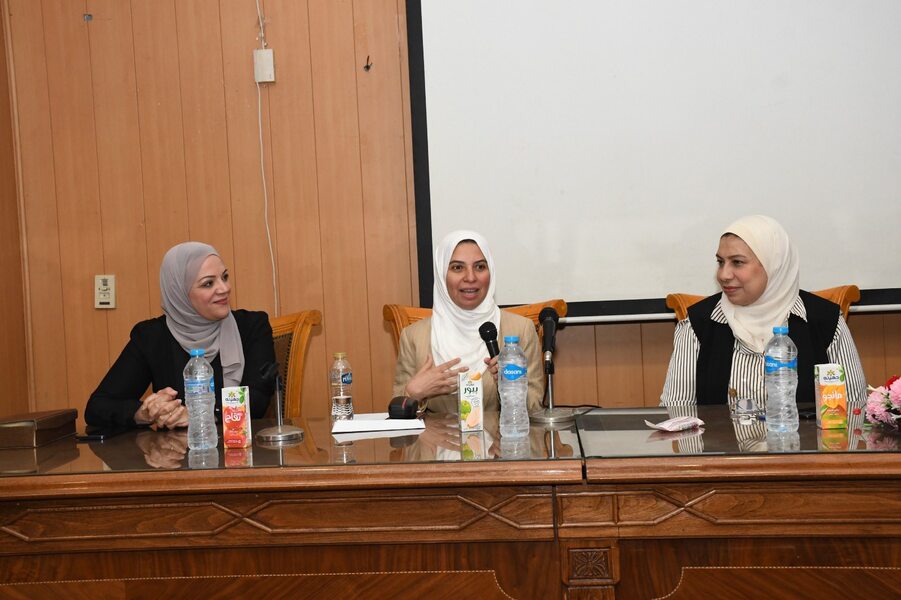The Faculty of Al-Alsun hosts a symposium titled "Towards an Inclusive University Environment" organized by the University Students Disability Service Center
The Faculty of Al-Alsun at Ain Shams University hosted a symposium titled "Towards an Inclusive University Environment," organized by the University Students Disability Service Center under the patronage of Prof. Mohamed Diaa Zain El-Abedeen, President of the University, and Prof. Salwa Rashad, Dean of the Faculty. The symposium was supervised by Prof. Hala Sayed Metwally, Vice Dean for Education and Student Affairs, and Prof. Rana El-Hilali, Director of the Center. The symposium was attended by Dr. Mustafa El-Shahed, Deputy Director of the Center, Dr. Reham El-Qady, Director of the Academic Guidance and Student Support Unit at the Faculty, and a host of department heads, faculty staff, teaching assistants, and students.
In her opening remarks, Prof. Salwa Rashad, Dean of the Faculty, emphasized that the challenge of disability represents one of the most important models that can contribute to the development of the university community. She noted that the Faculty continues its efforts to support students with disabilities by providing an inclusive educational environment that enables them to excel and integrate. She noted that the Faculty of Al-Alsun at Ain Shams University boasts many honorable role models for students with disabilities, including those working as faculty staff and teaching assistants, in addition to a group of distinguished graduates who hold prestigious positions.
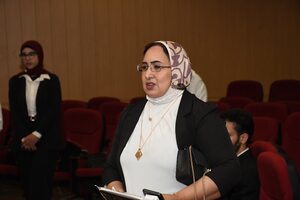 |
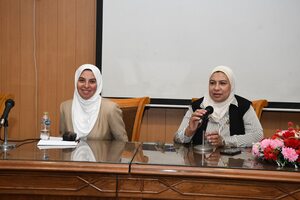 |
She noted that the Egyptian state's strategic plan today places great emphasis on people with disabilities. The university community is perhaps witnessing a qualitative shift in its treatment of students with various types of disabilities, providing numerous rehabilitation and integration programs with their colleagues in lecture halls. She also noted that communication with various companies is underway to train students with disabilities on the needs of the labor market and expand their employment opportunities within these companies.
For her part, Prof. Hala Sayed Metwally, Vice Dean for Education and Student Affairs, emphasized that the faculty seeks to provide a safe environment and a supportive academic climate for students with disabilities. This is achieved through well-thought-out steps, such as allocating a meeting day to directly identify their needs through communication with their parents. The faculty administration is also keen to provide direct communication channels with its students with disabilities to overcome any obstacles they encounter.
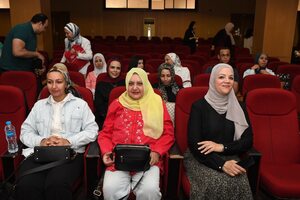 |
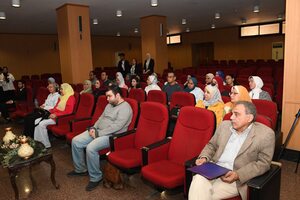 |
For her part, Prof. Rana Al-Hilali, Director of the Center, spoke about the efforts made to improve the university environment to meet the needs of people with disabilities. She noted that the Center develops an annual strategic plan that includes awareness-raising for families and people with disabilities themselves, in addition to training courses in areas such as Arabic, English, and white cane use.
She also emphasized the importance of mental health initiatives organized to support students and their families, facilitating their integration into the university community.
Prof. Rana El-Hilali indicated that there are more than 3,500 students with disabilities at Ain Shams University, enrolled in various faculties. Regarding accessibility, she emphasized that the university is working to provide accessibility in all faculties, both in buildings and classrooms, and that all codes for facilitating access for students with disabilities are observed in all new projects.
Regarding psychological support, Prof. Rana El-Hilali indicated that the center places great importance on providing psychological support to students by holding awareness meetings with parents and psychiatry professors. There are student support units in each faculty affiliated with the center.
Dr. Mustafa Al-Shahed, Deputy Director of the Center, addressed the etiquette of dealing with people with disabilities, noting that respecting others and appreciating their differences is a hallmark of civilized societies. Foremost among these is treating people with disabilities well. Proper treatment of people with disabilities requires awareness, respect, and a willingness to value them as human beings, regardless of their disability.
First, Understanding the Concept of Disability
It is essential to realize that disability is not a deficiency or inability, but rather a natural human condition, coexisting with millions around the world. A person with a disability may excel in various fields, such as art, sports, science, or other fields.
He explained the etiquette of conversation and communication. Address the person with a disability directly, not their companion. Do not speak to them in a loud or excessively slow voice unless they have a hearing or cognitive impairment. Use respectful and appropriate language, and avoid negative or slurred language such as "poor man" or "May God help you." Regarding physical interaction, he emphasized the importance of offering assistance only if the person requests it or clearly needs it. Do not hold their personal equipment, such as a wheelchair or white cane, without permission. Keep your gaze level with them if they are in a wheelchair.
He continued his speech, pointing to the importance of respecting independence. People with disabilities possess willpower and independence, so their decisions must be respected and opinions must not be imposed or assumed to be incapable of doing anything.
Regarding their integration into society, he pointed out the importance of treating people with disabilities naturally and avoiding excessive help or pity, which enhances their sense of inclusion. Furthermore, involving them in community, educational, and practical activities enhances their competence and self-confidence.
The symposium featured discussions on how faculty staff and teaching assistants can work with students with disabilities and provide an educational environment that integrates them into society. At the conclusion, Prof. Salwa Rashad, Dean of the Faculty, presented a shield to Dr. Rana Al-Hilali in appreciation of her efforts to advance the educational process and harness the full potential of the university to serve students with disabilities.


.svg)

